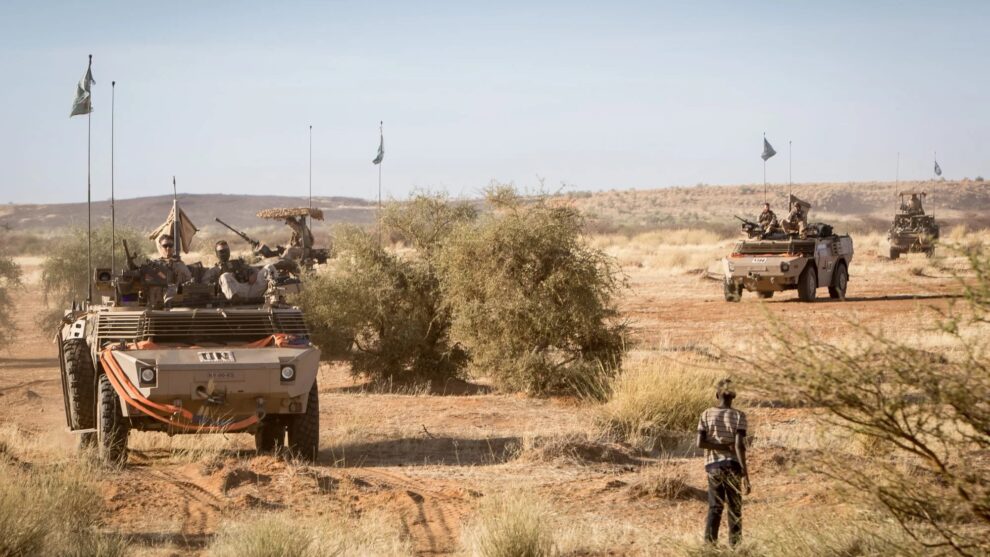As Washington and other Western capitals place increasing focus on the expanding footprint of the Kremlin’s Wagner Group in Africa, policymakers should understand the private military company’s motivations and capabilities and the dangers posed by its transactional relationships. While Wagner offers African militaries an alternative to Western security assistance, its military commitments are comparatively light, its conduct exacerbates the jihadist groups it purports to fight, and its willingness to invest the necessary resources to stem expanding jihadist violence is suspect. This poses a far more challenging conundrum for counterterrorism policy in Africa—what happens when Wagner fails?
In Washington and beyond, the expanded Russian geopolitical force in Africa—through the increasing presence of Russian-state-backed Wagner mercenaries—is eliciting anxiety. Simultaneously, violence perpetrated by branches of both Al-Qaeda and the Islamic State in Africa continues to reach unprecedented new levels, especially with the conclusion of France’s Operation Barkhane counterterror mission in November 2022. As Wagner makes itself an increasing presence in an African security landscape marked by capable and growing jihadist groups, how should the international community anticipate potential future shifts in the African counterterrorism landscape?
While the expanded presence of Wagner operations against jihadist groups is lamentable given the group’s numerous human rights violations, Wagner’s relatively limited commitments in counterterrorism missions and Russia’s more pressing European security concerns means that Wagner’s impact on the African jihadist landscape might be less powerful than some have feared. Further, disproportionate attention paid to the group’s activities in the Sahel may obfuscate more pressing structural inadequacies of the regional security forces that Wagner has been contracted to bolster.
Why Wagner’s Impact on the African Counter-Terror Landscape is Worrying
To be sure, European and American anxiety over Wagner’s presence is not unfounded. From a geopolitical perspective, Wagner throws into chaos an African security cooperation landscape historically dominated by Western allies. While the United States and France have been the frontrunners in African counterterrorism, the current moment sees a backlash against both countries. The United States has been heavily critiqued by local governments for a range of choices—its military-first approach to addressing al-Qaeda and the Islamic State; its targeted strikes of top jihadist leaders; and its support of unsavory governmental partners accused of corruption, fomenting insurrection in their home countries, or human rights abuses.
France has more recently borne the brunt of dissatisfaction with the African counterterrorism landscape. Despite nearly a decade of counterterrorism assistance throughout the Sahel and Sahara costing billions of euros, France ignominiously ended the Barkhane counterterrorism mission to counter jihadis across the Sahel in November 2022. Years of US and French counterterrorism assistance often came with heavy political or socioeconomic conditionalities related to democracy building and political blowback from local civil society in the form of protests, and ultimately did little to stop jihadist violence. Russia has offered Wagner as an alternative security force to various African states, particularly Mali, as a “could this be any worse?” option. With French retrenchment and US focus on priorities outside of Africa, the entrance of Wagner has scrambled patterns of alliances that, while never optimal, had been in place for decades.
Wagner’s entrance is also causing alarms for international policymakers and relevant stakeholders for its practices on the ground. While often inconsistent in practice, US and French counterterrorism efforts at least nominally emphasized respect for human rights, democracy, and rule of law. In contrast, Wagner has worked with authoritarian regimes, often to secure Russian access to primary resources, without regard for human rights concerns. In the limited time that Wagner has been on the ground in Mali, its presence has been marked by shocking abuses, including in the massacre of hundreds of civilians in March 2022. Indeed, a primary worry is that part of Wagner’s attractiveness to African states is precisely the absence of conditionality in its provision of security assistance, in sharp contrast to previous Western partners.
Wagner’s presence also complicates the missions of Mali’s remaining international security partners. For instance, those countries still contributing to the UN’s Multidimensional Integrated Stabilization Mission (MINUSMA) in Mali will have further trouble trying to operate around Wagner given deconfliction issues and an increasingly hostile government in Bamako. MINUSMA is already experiencing a significant reduction in troop strength as the UK, Germany, and Ivory Coast pull units from the mission. Moreover, following France, many other European partners are also withdrawing from Mali, leaving the junta in Bamako with few partners apart from Wagner. In neighboring Burkina Faso, the ruling junta in Ouagadougou has also forced international partners out, ostensibly opening the door for another Wagner deployment in Africa.
These dynamics only compound the issues of the current exodus of Western forces from Mail and Burkina Faso, leaving jihadis as the sole benefactor. For instance, analysis by Wassim Nasr has already demonstrated a clear link between Wagner’s deployment in Mali and worsening jihadi violence in that Wagner’s operations have acted as boon for jihadist recruitment and a rallying cry for attacks. For instance, Wagner’s participation in massacres in central Mali has acted as a recruitment tool for al-Qaeda’s Group for Support of Islam and Muslims (JNIM).
Why Worry Should Be (Somewhat) Tempered
However, Wagner’s approach has its limits. For instance, it is unclear if the group even contains the capabilities and resources to sustain a long-lasting commitment on par with France’s Barkhane. Second, its willingness to engage in war crimes and other human rights abuses, currently playing out across many parts of Mali, will only hasten public disapproval of its presence, particularly amongst those communities from which jihadist groups recruit and which security forces concentrate their attention.
Perhaps most important, however, is Wagner’s unreliability as a long-term counterterrorism partner for African militaries, in no small part due to its growing commitments in Ukraine. During the first half of 2022, as many as half of the 2,500 Wagner personnel stationed in Central African Republic were reportedly withdrawn, with some heading to Mali but most being redeployed to Ukraine. US officials further stated in July that an even larger withdrawal took place from Libya. The group’s increasingly critical role in Moscow’s war effort will likely only further limit the resources and assistance it can offer potential African partners and may require even more redeployments away from Africa.
Fundamentally, Wagner’s structure as an oligarch’s private army lowers the threshold for its commitment to long-term counterterrorism missions. The motivations and priorities of its leader, Yevgeny Prigozhin, are centered on offering Moscow a low-cost, deniable tool of foreign policy while also generating revenue. Where Moscow’s priorities are focused elsewhere or revenue-generating opportunities are limited, Wagner may be unwilling to invest the military resources needed to seriously combat jihadist groups, as seen with its short deployment to Mozambique.
While the group has reportedly secured control over a highly lucrative gold mine in the Central African Republic—allegedly set to generate as much as $1 billion in profit—such opportunities in Mali are far less likely. Though the Malian government reportedly pays Wagner $10 million per month and has opened up two gold mines for Wagner, the ruling junta in Bamako will likely struggle to offer Wagner opportunities as lucrative as those it has found in the CAR. Mali’s substantial gold mining sector is already a crowded field. Sizeable industrial mining sites are largely owned by foreign firms and the Malian government would likely put forth politically-fraught demands before Wagner could gain access to such sites. Smaller scale artisanal mines would likely be far less profitable and are largely under the control of either jihadist groups or other powerful armed groups who have signed ceasefire deals with the Malian government.
Conclusion
Amid Wagner’s commitments to Ukraine, their ability to invest the necessary resources to seize lucrative extractive sites will likely be limited. Without securing such sites, successfully combating resurgent jihadists in Mali (and potentially Burkina Faso) could be seen by Wagner as more cost than opportunity. Past engagements have shown that Wagner’s dependability as a long-term partner is contingent on financial opportunities and Moscow’s other interests, and Wagner has shown little hesitation in redirecting its efforts regardless of the consequences to its local partners. Such an underlying lack of reliability may, in time, be seen by African militaries as worse than the micromanagement and conditionality of Wagner’s Western predecessors. Wagner’s inevitable failure to accomplish what thousands of Western troops and billions of dollars could not may thus undercut its appeal as an effective partner, a potentiality brought into focus by al Qaeda’s expanding presence around Mali’s capital in recent months.
Wagner’s inability to deploy enough forces on the ground to stem jihadist violence and its own historically fickle attitude towards long-term deployments thus poses an even more vexing problem for Western counterterrorism policy. While Western partners may like to see Wagner’s departure, the absence of any external security force providing assistance to Mali or neighboring states may create major security vacuums that jihadists will inevitably be quick to exploit. But the West should not wholly abandon states like Mali, despite clear anti-Western sentiment from the current governments, particularly in Bamako. Western policy should not be solely obsessed with the presence of Wagner, but instead be firmly focused on the underlying and deeply entrenched conflict dynamics that provided Wagner with an opportunity to become involved and itself contribute to the overarching problems. And when Wagner inevitably fails and retreats, the West would thus be better positioned to help local states.
The Sahel’s rapidly expanding and intensifying jihadist insurgencies will desperately require “day after” planning by the West for if—and more likely when—Wagner’s inability to stem the violence and its plausible departure only further erodes state authority and threatens the stability of Mali’s neighbors. To prevent wider, more dangerous conflicts on the continent, the West must be prepared to work with willing African partners to contain the fallout of a worsening security climate in the Sahel brought on by Wagner’s inability to stem jihadist violence and its central role in exacerbating the threat.
Source : SFS











